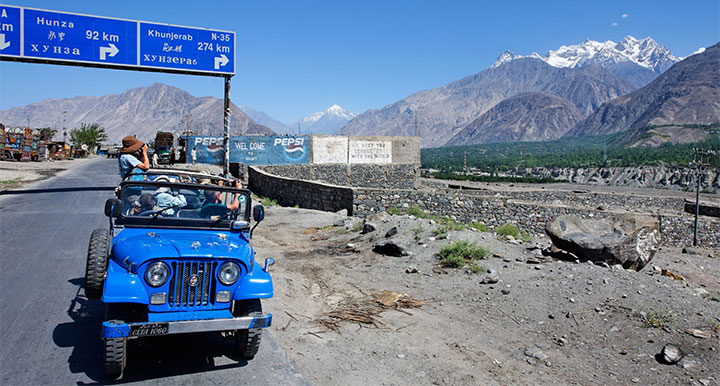By: Maqsood Shahi
Gilgit-Baltistan, with its breathtaking landscapes, snow-capped mountains, and vibrant culture, possesses immense importance. The region is home to several world-renowned tourist destinations, including the Karakoram Highway, the Hunza Valley, the world’s eight highest vertiginous peaks, Deosai, the cold desert Skardu, and the Khunjerab Pass, which is the highest international border crossing in the world. This region is generally known for its fabulous natural beauty, captivating culture, and strategic location. Despite the region’s enormous potential for development, it has faced many challenges, including poverty, a lack of infrastructure, and environmental degradation. Sustainable development is pivotal to addressing these challenges and ensuring the region’s long-term prosperity. This article sheds light on the challenges and opportunities for sustainable development in Gilgit-Baltistan, focusing on the need for eco-friendly tourism and renewable energy sources.
The world is focusing on the SDGs to eliminate poverty, raise living standards, improve health conditions, boost the education system, and achieve many more objectives. However, progress towards these goals in Gilgit-Baltistan is yet to be achieved.
Gilgit-Baltistan faces several challenges that hinder sustainable development. One of the most significant challenges is poverty. According to the Pakistan Social and Living Standards Measurement Survey, around 45% of Gilgit Baltistan’s population lives below the poverty line, which is comparatively low compared to our neighbor Bangladesh. Estimated poverty has decreased from 13.47 in 2016 to 10.44 in 2022 (using the international poverty line of $2.15). Poverty is a significant obstacle to development as it substantially limits access to education, healthcare, and other basic needs.
Another colossal challenge is the failing infrastructure. Gilgit Baltistan has a limited road network, and many areas are inaccessible during the winter months due to heavy snowfall. This makes it challenging to transport goods and services, which impacts the economy. According to Dawn newspaper, a “record revenue” of around Rs 1 billion was collected from trade activities at the Sost dry port in the first 20 days of December 2022. Amelioration in trade fosters in case of blockage of roads due to rainfall and snowfalls. There is much potential if purposeful infrastructure is made, which will lay the foundation stone for future prosperity and sustainability in Gilgit-Baltistan. During an interview, Muhammad Ashraf, the Manager of the Baltistan Continental Hotel, mentioned the poor infrastructure and road conditions of Skardu. He said that the Desai Road remains closed almost the whole year except for June to August, which is not good for tourism in Gilgit Baltistan. The geostrategic location of Gilgit Baltistan serves as a gateway for CPEC, and its people are increasingly resentful of mining, road building, and other contracts for outsiders, according to left-wing political thinker Dr. Aasim Sajjad Akhter.
Furthermore, the most ostensible problem is electricity. According to a report by the Aga Khan Foundation, around 60% of schools in the region are without electricity, and 25% do not have access to clean drinking water. Load shedding is at its peak, and more than 15+ hours of light remain off the scene in cities of GB. Power theft and unpaid bills are a common scenario here, yet no management is seen pertaining to these issues. More dams need to be made, unreliantly, after Sadpara lake and Ataabad Lake Hunza, which was made in 2003 and 2010, respectively. No further steps have been taken in this regard. The water level in both lakes is unimaginably low.
The hoi polloi are facing an acute shortage of water and electricity, both of which are directly related. Scientists predict that climate change will cause glaciers to melt more rapidly than in the past, resulting in decades of unpredictable floods and droughts, particularly in the most vulnerable areas of Gilgit Baltistan. One possible solution is to build a robust infrastructure.
Environmental degradation is also a significant challenge worth mentioning. Gilgit Baltistan’s natural beauty attracts tourists, but unsustainable tourism practices have led to environmental degradation. For example, the construction of hotels and resorts in sensitive ecological areas has damaged fragile ecosystems. 5,650 kg of waste were collected from K2-Baltoro, according to Pamir’s time. Once a netizen wrote on social media, “Now we see masks and other waste, like used condoms, on the streets.” This is a perspective and portrayal of hellish tourism in Gilgit Baltistan. Deforestation, soil erosion, and water pollution are other environmental issues that need to be addressed soon; otherwise, the vulnerability will likely be fostered, and it will be an insurmountable challenge in the near future.
Opportunities for Sustainable Development in Gilgit-Baltistan
Despite these perpetuating challenges, Gilgit-Baltistan has enormous potential for sustainable development. The region’s natural beauty and unique culture can be leveraged to promote eco-friendly tourism, while the region’s abundant natural resources can be utilized to develop renewable energy sources.
Eco-Friendly Tourism is a crucial sector in Gilgit-Baltistan’s economy. According to the Gilgit Baltistan Tourism Department, the region received around 1.5 million tourists in 2019, generating PKR 60 billion in revenue. However, current tourism practices are not sustainable and have led to environmental degradation.
To promote sustainable tourism, the government of Gilgit-Baltistan has launched several initiatives. For example, the region’s tourism department has started promoting community-based tourism, which involves local communities providing accommodation and other services to tourists. This helps to distribute the benefits of tourism more evenly and promotes cultural exchange.
The government is also promoting eco-friendly tourism by encouraging tourists to follow sustainable practices such as using reusable water bottles, avoiding single-use plastics, and respecting local cultures and customs. The government has also launched a campaign to clean up the region’s natural areas and is working to develop a waste management system.
Renewable Energy Sources: Gilgit-Baltistan has abundant natural resources that can be utilized to develop renewable energy sources. The region has high solar and wind potential, and hydropower is already a significant source of electricity. According to the Pakistan Water and Power Development Authority, Gilgit Baltistan has a hydropower potential of around 40,000 MW, of which only 2,000 MW have been developed.
The government of Gilgit Baltistan is promoting the development of renewable energy sources by offering incentives to investors and providing a conducive policy environment. For example, the government has waived taxes and duties on renewable energy projects and is offering land at concessional rates. The government is also working to develop transmission infrastructure to connect renewable energy projects to the national grid.
In conclusion, sustainable development is essential for Gilgit-Baltistan’s long-term prosperity. The region faces several challenges, including poverty, a lack of infrastructure, and environmental degradation. However, the region also has enormous potential for sustainable development, particularly in eco-friendly tourism and renewable energy sources. The Gilgit Baltistan administration can help close the gap with the aid of more sincere and competent officials, such as the respected Mohiyuddin Wani, the chief secretary of GB. Even though the government hasn’t invested much money here, we are currently witnessing significant advancements and improvements across the board, especially in the fields of education and health, under the direction of the chief secretary. Possibly, but these are insufficient. In order to reach the golden age, we must expand these blue horizons.
The writer is a freelance columnist. He can be reached at [email protected]



